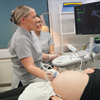Pregnancy is a remarkable time for many women, but it can also bring about significant changes in the body. While most focus on the obvious transformations—such as the growing belly or hormonal shifts—it’s equally important to consider the effects pregnancy can have on oral health. Hormonal fluctuations during pregnancy can contribute to various dental issues, including gum disease and tooth decay. Additionally, if proper nutrition isn’t maintained, calcium depletion can have a lasting impact on your teeth. Here’s a closer look at how pregnancy can affect your dental health and what you can do to keep your teeth in tip-top shape during this transformative time.
Hormonal Changes and Their Effect on Gum Health
During pregnancy, hormonal changes are at their peak, with a notable increase in progesterone and oestrogen levels. These hormones can lead to several changes in the body, including the gums. The most common oral health issue during pregnancy is pregnancy gingivitis, a condition where the gums become swollen, inflamed, and bleed more easily, especially during brushing or flossing. This happens because the increased hormones can make the gums more sensitive to plaque, the sticky film of bacteria that forms on your teeth.
If left untreated, pregnancy gingivitis can progress into more serious forms of gum disease, such as periodontitis. Gum disease is not only harmful to oral health but has also been linked to premature birth and low birth weight. It’s essential to maintain regular dental check-ups and be diligent about your oral hygiene to keep gum disease at bay.
Tooth Decay and Increased Sensitivity
Another consequence of pregnancy is a heightened risk of tooth decay. The cravings for sugary or acidic foods during pregnancy can lead to an increase in plaque and bacteria in the mouth. This, combined with the fact that many pregnant women may experience changes in their dental routine due to nausea or morning sickness, can increase the likelihood of cavities developing.
Moreover, increased levels of acid in the mouth, whether from vomiting during morning sickness or from the consumption of acidic foods, can wear down tooth enamel and lead to greater sensitivity. This makes it even more important to care for your teeth by brushing with fluoride toothpaste, using mouthwash, and visiting your dentist regularly.
Calcium Depletion and Its Effect on Teeth
Pregnancy demands a significant amount of nutrients for the development of your baby, and calcium plays a crucial role in that process. If you’re not getting enough calcium through your diet or supplements, your body may begin to draw from your stores of calcium in your bones and teeth to support the growing baby. This depletion can lead to weakened tooth enamel and an increased risk of cavities.
It’s important to ensure you’re consuming enough calcium-rich foods such as dairy products, leafy green vegetables, and fortified foods. If you have trouble meeting your calcium needs through food alone, your healthcare provider may recommend a calcium supplement to ensure both your dental health and the health of your baby are supported.
Practical Tips for Maintaining Oral Health During Pregnancy
To ensure your teeth and gums stay healthy during pregnancy, here are some practical tips:
- Maintain a Consistent Oral Hygiene Routine: Brush your teeth at least twice a day with fluoride toothpaste, and floss daily to remove plaque. Use a soft-bristled toothbrush to avoid irritating swollen gums.
- Visit Your Dentist Regularly: Regular dental check-ups are essential during pregnancy. Inform your dentist that you are pregnant so they can adjust their treatment accordingly and ensure any dental procedures are safe for you and your baby.
- Manage Morning Sickness Carefully: If you’re experiencing morning sickness, rinse your mouth with water or a mild mouthwash after vomiting to neutralise stomach acids. Avoid brushing your teeth immediately after vomiting, as the enamel may be softened by the acid and could be damaged.
- Eat a Balanced Diet: Make sure your diet includes plenty of calcium-rich foods, such as milk, cheese, yoghurt, and leafy greens. Also, ensure you’re getting enough vitamin D, which helps your body absorb calcium.
- Stay Hydrated: Drinking plenty of water helps wash away food particles and reduces the acidity in your mouth, promoting better overall oral health.
- Address Pregnancy Cravings Wisely: While cravings are a natural part of pregnancy, try to make healthier choices that are less likely to damage your teeth. If you do indulge in sugary snacks, try to brush your teeth afterwards or drink water to rinse away the sugars.
Conclusion
Pregnancy can have a significant impact on your teeth and oral health. The hormonal changes, cravings, and nutritional demands can all contribute to gum disease, tooth decay, and calcium depletion if not carefully managed. By prioritising good oral hygiene, maintaining a balanced diet, and visiting your dentist regularly, you can keep your teeth and gums healthy during this special time in your life. Remember, a healthy smile is not only important for your well-being but also for your baby’s health.
So, if you’re pregnant, don’t forget to take care of your oral health—it’s an essential part of your overall care during this exciting journey.













 Packages & Prices
Packages & Prices  Important Info & Policies
Important Info & Policies  Your Scan
Your Scan